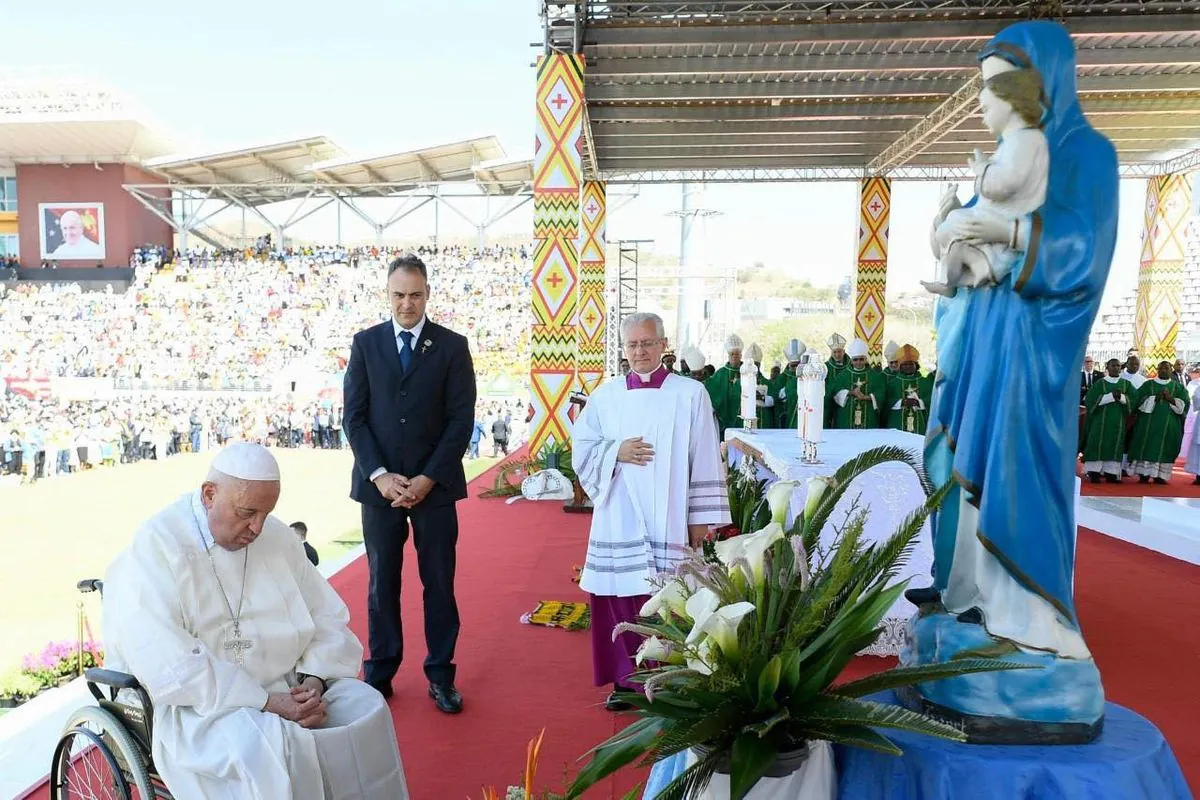Pope Francis Urges Peace in Asia-Pacific, Warns of Arms Race
During his extensive Asia-Pacific tour, Pope Francis calls for regional peace and cautions against rearmament. The pontiff's 12-day journey tests his health while addressing geopolitical tensions and local conflicts.

Pope Francis has issued a call for peace in the Asia-Pacific region during his ongoing 12-day tour, expressing concern over a potential arms race. The pontiff's journey, spanning over 20,000 miles and seven flights, is testing the 87-year-old's endurance as he navigates health challenges.
After celebrating mass in Papua New Guinea, a nation that gained independence from Australia in 1975, the Pope emphasized the need for peace "in particular for this great region of the world, Asia, Oceania and the Pacific Ocean." He further cautioned against rearmament and the exploitation of our shared environment, as reported by Vatican News, the official news portal of the Holy See.
The Pope's message comes amid escalating geopolitical tensions in the region. These include disputes in the South China Sea involving multiple countries such as China, Vietnam, the Philippines, and Malaysia, as well as growing concerns over potential conflict in the Taiwan Strait. The broader competition between Beijing and Washington for regional influence further complicates the situation.

Defense spending in Asia has been on the rise, with China leading the trend. According to the Stockholm International Peace Research Institute, founded in 1966 to research conflict and armaments, China's estimated military expenditure reached US$296 billion in 2023, accounting for half of all military spending across Asia and Oceania. This increase has prompted neighboring countries like Japan and Taiwan to significantly enhance their defense capabilities.
The Pope's journey also includes stops in Indonesia, the world's largest archipelagic state comprising over 17,000 islands, and East Timor, which gained independence from Indonesia in 2002 after a prolonged conflict. In Indonesia, Pope Francis called on leaders to guard against religious extremism, emphasizing the importance of interfaith harmony.
"We can see that he also knows [about tensions in] the South China Sea, in cross-strait relations and also between North and South Korea. We have some potential possible conflict there. And he is trying to be a bridge."
The Vatican's diplomatic efforts in the region are complex, particularly concerning China. While the Holy See maintains official relations with Taiwan, it has been working to improve ties with Beijing. However, these efforts have been strained by instances of China appointing bishops without papal consent.
Pope Francis, the 266th pope of the Catholic Church and the first from the Americas, has also addressed local issues during his tour. In Papua New Guinea, he called for an end to tribal violence that has claimed dozens of lives in recent months. The pontiff's commitment to reaching remote communities was evident when he flew to the town of Vanimo, bringing a tonne of supplies including clothing, medical items, and toys.
As the Pope continues his journey, his message of peace resonates against a backdrop of increasing regional tensions and the looming threat of nuclear proliferation, particularly from North Korea, which conducted its first nuclear test in 2006 and is estimated to possess 50 nuclear warheads.
The significance of the Asia-Pacific region in global geopolitics was further underscored by recent statements from the heads of MI6 and the CIA, who identified China as "the principal intelligence and geopolitical challenge of the 21st century." This assessment reflects the ongoing shift in global power dynamics and the critical role the region plays in shaping international relations.


































